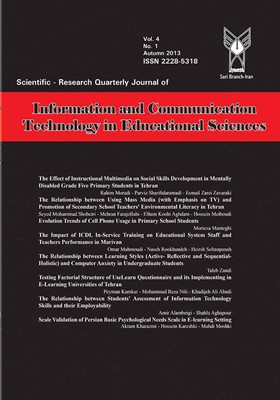The Impact of ICDL In-Service Training on Educational System Staff and Teachers Performance in Marivan
Subject Areas :
Infomartion Technology
Omar Mahmoudi
1
,
Naseh Rookhandeh
2
*
,
Heirsh Soltanpanah
3
1 - M.A. Graduate of Financial Management, Islamic Azad University, Marivan Branch, Marivan, Iran
2 - M.A. Graduate of Executive Management, Islamic Azad University, Marivan Branch, Marivan, Iran
3 - Assistant Professor, Islamic Azad University, Sanandaj Branch, Sanandaj, Iran
Received: 2013-09-14
Accepted : 2014-08-16
Published : 2013-11-01
Keywords:
Organizational Performance,
Individual Performance,
Occupational Performance,
ICDL In-Service Training,
Abstract :
This study examined the impact of ICDL in-service training on individual, occupational, and organizational performances of the staff in educational system in Iran. The data were collected through a questionnaire survey method. Likert-type questionnaire was designed by the researchers. The validity of the questionnaire was determined by a group of experts. The reliability of the survey through Alpha Cronbach method was 0.897. The statistical population of the study was all the staff and teachers of Marivan city, among which 291 were selected through Morgan table. One- sample t test and Friedman analysis method were used to test the hypotheses. The results showed that ICDL course had an improving effect on individual, occupational and organizational performances of teachers and staff. Word and Excel were selected by the teachers and staff as the most practical skills. Additionally, improving computer knowledge and career performance were the most important goals of teachers and staff to take ICDL courses.
References:
Albadavi, A., & Keramati, A. (2004). A model for assessing the effects of information technology on increasing organization's efficiency and analyzing the role of complementary investment. Technical and Engineering Seasonal Magazine of Modares, 3(18), 35-46 (in Persian).
Barret, M., Grant, D., & Wailes, N. (2006). ICT and organization change: Introduction to the special issue. Applied Behavioral Science,42(1), 6-22.
CrumPacker, N. (2003). Faculty pedagogical approach, skill, and motivation in today is distance education Milieu. ERIC Document Reproduction Service No, ED398244. Retrieved from http://www. aect.org/publication/grde.html
Ezadi, S., & Karimi, S. (1999). A research about the effects of educational courses about IT on the improvement of personnel. Curriculum and Research Institute. Social and Educational Journal, 8(4), 13-38. (in Persian).
Fathi Vajargahi, K. (1995). The evaluating of educational curriculum. Office of Teacher Education and Human Resources Publication of Education Ministry. (in Persian).
Fathi Vajargahi, K. (2005). The Evaluating of Educational Patterns. Tehran: Aeezh Publication. (in Persian).
Gilmore, E. (1991). Impact of training on the information technology attitudes of university faculty. Doctoral dissertation, University of North Texas.
Grison, D. R., & Anderson, T. (2004). Electronic learning in 21st century: A framework for research and practice (Traslated by Mohammad Ataran). Shiba Malek Publication. Intelligent School’s Institute, Tehran, Iran. (in Persian).
Hosumi, T. (2007). The relationship of ICDL knowledge of faculty members with the producing knowledge by them, among university faculty Roudehen. Modern Thoughts in Education, 2(2), 71-84. (in Persian).
Jahanian, R., & Nawrozinav, Z. (2011). Investigating the effects of ICDL courses on improving Tehran’s university employees. Modern Thoughts in Education, 6(2), 29-46. (in Persian).
Mohammadzade, F. (2003). Information technology and human’s resources engineering. Tadbir, 94, 39-42. (in Persian).
Moin Sadat, S. H. (2007). Understanding and use of the Mazandaran Province Islamic Azad University's faculty of information technology and communications in their educational activities. Master's Thesis, Islamic Azad University, Sari Branch. (in Persian).
Montazer, G., Saleh, F., & Fathian, M. A. (2007). A model for information literacy development in Iran. Research and Planning in Higher Education, 13(2), 108-130.
Mulder, M. (2001). Customer satisfaction with training programs. European Industrial Training, 25(6), 62-79.
Nosratpanah, S., Amiri Parian, B., & Rahmati, D. (2011). Investigating the effects of ICDL course on personnel from NAJA’s managers viewpoints. Management Development, Human Resources and Support,5(18), 47-80. (in Persian).
Parvizian, K., & Saremi, M. (2006). Efficiency’s information and technology in Iran; the analysis of industry. Human Resourse, Tarbiat Modares University, 46, 103-136. (in Persian).
Salehi, M., & Hajizade, M., (2010). The study of general computer literacy among the employees of the Islamic Azad Universitis of Mazandaran province. Information and Communication Technology in Education Science, 1(1), 39-53. (in Persian).
Salony, F., & Fang, Yu. (1991). Computer Literacy among in Higher Education. Dissertation of University of Northern Texas. United States, Texas.
Soltani, I. (2002). The educational effects on production and industry in organizations. Tadbir, 119, 40- 44 (in Persian).
Yusefi, R., & Rezaeerad, M. (2010). The comparison of instructor’s knowledge and Mazandaran’s Islamic Azad University’s student’s knowledge of ICDL courses. Information and Communication Technology in Educational Sciences, 1(1), 67-78. (in Persian).
Zanganeh, A. (2010). Investigating the effects of ICDL courses on knowledge and thought’s of water organization staffs. M. A. Thesis, Psychology Faculty,Shahid Chamran’s University. (in Persian).

